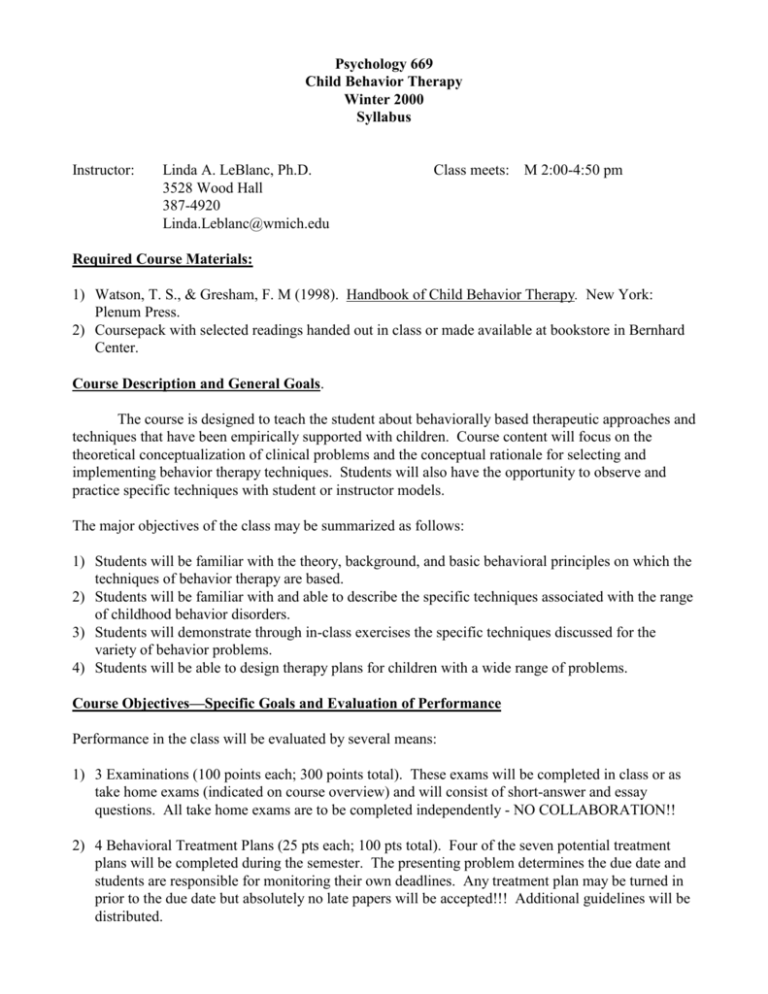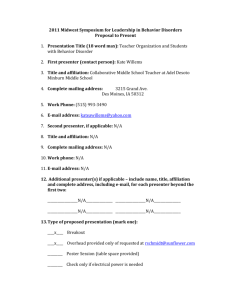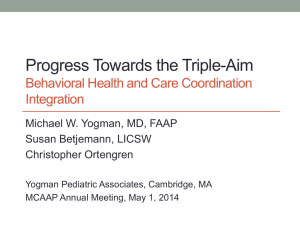PSY 669 - Association for Behavior Analysis International
advertisement

Psychology 669 Child Behavior Therapy Winter 2000 Syllabus Instructor: Linda A. LeBlanc, Ph.D. 3528 Wood Hall 387-4920 Linda.Leblanc@wmich.edu Class meets: M 2:00-4:50 pm Required Course Materials: 1) Watson, T. S., & Gresham, F. M (1998). Handbook of Child Behavior Therapy. New York: Plenum Press. 2) Coursepack with selected readings handed out in class or made available at bookstore in Bernhard Center. Course Description and General Goals. The course is designed to teach the student about behaviorally based therapeutic approaches and techniques that have been empirically supported with children. Course content will focus on the theoretical conceptualization of clinical problems and the conceptual rationale for selecting and implementing behavior therapy techniques. Students will also have the opportunity to observe and practice specific techniques with student or instructor models. The major objectives of the class may be summarized as follows: 1) Students will be familiar with the theory, background, and basic behavioral principles on which the techniques of behavior therapy are based. 2) Students will be familiar with and able to describe the specific techniques associated with the range of childhood behavior disorders. 3) Students will demonstrate through in-class exercises the specific techniques discussed for the variety of behavior problems. 4) Students will be able to design therapy plans for children with a wide range of problems. Course Objectives—Specific Goals and Evaluation of Performance Performance in the class will be evaluated by several means: 1) 3 Examinations (100 points each; 300 points total). These exams will be completed in class or as take home exams (indicated on course overview) and will consist of short-answer and essay questions. All take home exams are to be completed independently - NO COLLABORATION!! 2) 4 Behavioral Treatment Plans (25 pts each; 100 pts total). Four of the seven potential treatment plans will be completed during the semester. The presenting problem determines the due date and students are responsible for monitoring their own deadlines. Any treatment plan may be turned in prior to the due date but absolutely no late papers will be accepted!!! Additional guidelines will be distributed. 3) Therapy Guidelines - (75 pts). Each student will select a specific presenting problem and will compile a therapy guideline book for that problem. The therapy guidelines will be distributed to your fellow students as a tool for their future therapeutic activities. If an empirically supported treatment exists for your problem area, your guidelines should definitely include it. Your final product should include an APA format reference list and specific instructions for designing and conducting therapy. Additional information will be distributed during the semester. Guidelines will be graded on their completeness, appropriateness of reference list, clarity, and writing. 4) In-class Participation - (25 pts). I will assign a specific grade based on each student’s participation during the course of the semester. Participation will be operationally defined as 1) actively engaging in in-class discussions (vocal verbal behavior, please), 2) asking and answering provocative questions, 3) actively supporting the participation of other student’s in the class. I will provide feedback on your performance during the semester. Course grades will be distributed as follows: Based on 500 total points: A= B= C= D= E= 450-500 400-449 350-399 300-349 Below 300 Course Policies: 1. Make up examinations. If you have an unavoidable emergency (medical problem, death in family, etc.) that prevents you from taking a scheduled examination, contact me immediately PRIOR to the exam. You will be required to take an alternative examination at the soonest possible date. 2. Academic Dishonesty. Any instances of academic dishonesty will be reported to the university administration for institutional review and consequences. Academic dishonesty includes plagiarism, turning in an assignment for multiple classes, illegal access to schedules evaluations, or collaboration on an individual assignment or performance evaluation. Please see the complete section on academic dishonesty in the undergraduate and graduate catalog (also available on the web). 3. Grade Disputes. If you have detected some error in calculation, bring it to my attention in my office as soon as you detect it. If you disagree with some other aspect of the grading of the paper, you must submit a written request for a re-grading of the paper based on the EXISTING content of the paper (not what you MEANT to say). Submit the request directly to me and arrange an appointment for detailed feedback. 4. Severe Weather Policy. If the University is closed due to severe weather, any quiz will be cancelled and the material will be covered on the next week’s quiz (as well as the assigned readings for the second week). 5. I reserve the right to alter the following course content schedule based on the progress of the class. All tests will occur on the assigned dates, but the material we cover may vary. COURSE OVERVIEW DATE TOPIC Reading Assignment Jan 8 Course Overview, Review of Syllabus, History of Child Behavior Therapy Key Features of Applied Behavior Analysis Readings handed out in class - Peterson (1997) and comments Jan 15 Jan 22 NO CLASS: MLK DAY Assessing Behavior and Treatment Outcome: Single-Case Design and Functional Assessment Jan 29 Anxiety and Fear in Children Feb 5 Exam Feb 12 Childhood Depression Feb 19 Oppositional Behavior and Antisocial Behavior Mar 5 Antisocial Behavior Chapter 23 Kirigin et al (1982) Blakely & Davidson Bank et al (1991) Behavioral Contracting Mar 12 Attention Problems and Academic Problems Chapters 4, 6 MTA Group (1999) Dupaul & Ervin (1996) Evans et al (1995) Powell & Nelson (1997) Group Contingencies in the Classroom Mar 19 Eating Disorders: Pediatric Feeding disorders, Anorexia and Bulmia Practical Skill Chapter 1 and 2 Functional Assessment Chapters 8 and 19 Ollendick (1995) Chorpita et al (1996) Relaxation Skills Training Due Phobia TX Plan Due Chapter 20 Chapter 24 Dujovne et al (1995) Chapter 9, Ducharme (2000), Eyberg et al (1995) Kazdin (2000) Self-Monitoring Parent Training Chapter 17 & 18 Kerwin (1999) and commentary Others TBA Depression Tx Plan Due Antisocial Behavior Tx Plan Due ADHD Tx Plan Due Take home exam due today Mar 26 Pediatric Psychology: Chronic Illness, Pain Management Chapter 14 & 16 Carton & Schweitzer (1996) Adherence chapter Others TBA Token Economy Eating Disorders Tx Plan Due Apr 2 Eneuresis and Encopresis Habit Disorders Sleep Problems Chapters 11, 13, & 22 Others TBA Habit Reversal Therapy Guidelines Due Task Analysis and Chaining Eneuresis Tx Plan Due Sleep Tx plan due Apr 9 Apr 18 Developmental Disabilities and Autism Course Summary EXAM 3******* Watson & Sterling (1998) Chapters 21 & 25 Ozonoff & Cathcart (1998) Smith (1999) Others TBA Wednesday 12:30-2:30 Recommended Outside Readings Kazdin, A. & Wassell, G. (2000). Therapeutic changes in children, parents, and families resulting from treatment of children with conduct problems. Journal of the American Academy of Child and Adolescent Psychiatry, 39, 414-420. Watson, T. L., Bowers, W. A., & Andersen, A. E. (2000). Involuntary treatment of eating disorders. American Journal of Psychiatry, 157, 1806-1810. Jongsma, A. E., Peterson, L. M., & McInnis, W. P. (2000). The adolescent psychotherapy treatment planner (2nd ed.). New York: John Wiley & Sons. Irving, L. M. (2000). Promoting size acceptance in elementary school children: The EDAP puppet program. Eating Disorders: The Journal of Treatment & Prevention, 8, 221-232. Richards, P. S., Baldwin, B. M., Frost, H. A., Clark-Sly, J. B., Berrett, M. E., Hardman, R. K. (2000). What works for treating eating disorders? Conclusions of 28 outcome reviews. Eating Disorders: The Journal of Treatment & Prevention, 8, 189-206. Park, R. J. & Goodyer, I. M. (2000). Clinical guidelines for depressive disorders in childhood and adolescence. European Child and Adolescent Psychiatry, 9, 147-161. Silverthorne, P. Durrant, S. L. (2000). Custodial grandparenting of the difficult child: Learning from the parenting literature. In B. Hayslip, R. & Goldberg-Glen (Eds) Grandparents raising grandchildren: Theoretical, empirical, and clinical perspectives (pp. 47-63). New York: Springer Publishing. Tynan, W. D., Schuman, W., & Lampert, N. (1999). Concurrent parent and child therapy groups for externalizing disorders: From the laboratory to the world of managed care. Cognitive and Behavioral Practice, 6, 3-9. Stein, D. B. (1999). Outpatient behavioral management of affressiveness in adolescents: A response cost paradigm. Aggressive Behavior, 25, 321-330. Powell, S., Calkins, C., Quealy-Berge, D., Bardos, A. N. (1999). Adolescent day treatment: A school and community based alternative to residential care. Journal of Developmental and Physical Disabilities, 11, 275-286. Kazdin, A. (1977). Assessing the clinical or applied importance of behavior change through social validation. Behavior Modification, 1, 427-451. Miltenberger, R. G. (1990). Assessment of treatment acceptability: A review of the literature. Topics in Early Childhood Special Education, 10, 24-38. Hawkins, R. P. (1991). Is social validity what we are interested in? Argument for a functional approach. Journal of Applied Behavior Analysis, 24, 205-213. Tarnowski, K. J., Mulick, J. A., and Rasnake, L. K. (1990). Acceptability of behavioral interventions for self-injurious behavior: Replication and inter-institutional comparison. American Journal on Mental Retardation, 95, 182-187. ** Lloyd, J. W., and Heubusch, J. D. (1996). Issues of social validation in research on serving individuals with emotional or behavioral disorders. Behavioral Disorders, 22, 8-14. Rasnake, L. K., Martin, J., Tarnowski, K. J., and Mulick, J. A. (1993). Acceptability of behavioral treatments: Influence of knowledge of behavioral principles. Mental Retardation, 4, 247-251.** Broussard, C. D., and Northup, J. (1995). An approach to functional assessment and analysis of disruptive behavior in regular education classrooms. School Psychology Quarterly, 10, 151-164.** Vollmer, T. R., and Northup, J. (1996). Some implications of functional analysis for school psychology. School Psychology Quarterly, 11, 76-92. Iwata, B. A., Dorsey, M. F., Slifer, K. J., Bauman, K. E., and Richman, G. S. (1982/1994). Toward a functional analysis of self-injury. Journal of Applied Behavior Analysis, 27, 197-209.** Lennox, D. B., and Miltenberger, R. G. (1989). Conducting a functional assessment of problem behavior in applied settings. Journal of the Association for Persons with Severe Handicaps, 14, 304-311. Gable, R. A. (1996). A critical analysis of functional assessment: Issues for researchers and practitioners. Behavioral Disorders, 22, 36-40. Barrett, P. M. (1998). Evaluation of cognitive-behavioral group treatments for childhood anxiety disorders. Journal of Clinical Child Psychology, 27, 459-468. ** de Costa, I. G., Rapoff, M. A., Lemanek, K., Goldstein, G. L., (1997). Improving adherence to medication regimes for children with asthma and its effect on clinical outcome. Journal of Applied Behavior Analysis, 30, 687-691.** Carton, J. S., & Schweitzer, J. B. (1996). Use of a token economy to increase compliance during hemodialysis. Journal of Applied Behavior Analysis, 29, 111-113.** Fox, R. M. (1998). A comprehensive treatment program for inpatient adolescents. Behavioral Interventions, 13, 67-77.** Kazdin , A. E., and Bootzin, R. R. (1972). The token economy: An evaluative review. Journal of Applied Behavior Analysis, 5, 343-372. Swain, J. C., and McLaughlin, T. F. (1998). The effects of bonus contingencies in a classwide token program on math accuracy with middle-school students with behavioral disorders. Behavioral Interventions, 13, 11-19.** Cavalier, A. R., Ferretti, R. P., and Hodges, A. E. (1997). Self-management within a classroom token economy for students with learning disabilities. Research in Developmental Disabilities, 18, 167-178.** Kazdin, A. E. (1982). The token economy: A decade later. Journal of Applied Behavior Analysis, 15, 431-445. Miltenberger, R. G., Fuqua, R. W., and Woods, D. W. (1998). Applying behavior analysis to clinical problems: Review and analysis of habit reversal. Journal of Applied Behavior Analysis, 31, 447-469. Sheinkopf, S. J., and Siegel, B. (1998). Home-based behavioral treatment of young children with autism. Journal of Autism and Developmental Disorders, 28, 15-23. ** Gresham, F. M., and MacMillan, D. L. (1998). Early intervention project: Can its claims be substantiated and replicated? Journal of Autism and Developmental Disorders, 28, 5-13. Smith, T. and Lovaas, O.I. (1997). The UCLA Young Autism Project: A reply to Gresham and MacMillan. Behavioral Disorders, 22, 202-218. Gresham, F., and MacMillan, D. L. (1997). Denial and defensiveness in the place of fact and reason: Rejoinder to Smith and Lovaas. Behavioral Disorders, 22, 219-230. Horvath, K., Stefnatos, G., Sokolski, K. N., Wachtel, R., Nabors, L., and Tildon, J. T. (1998). Improved social and language skills after secretin administration in patients with autistic spectrum disorders. Journal of the Association for Academic Minority Physicians, 9, 9-15. ** Pierce, K., and Schreibman, L. (1997). Multiple peer use of pivotal response training social behaviors of classmates with autism: Results from trained and untrained peers. Journal of Applied Behavior Analysis, 30, 157-160. ** Pfiffner, L. J. and McBurnett, K. (1997). Social skills training with parent generalization: Treatment effects for children with attention deficit disorder. Journal of Consulting and Clinical Psychology, 65, 749-757. ** Magee Quinn, M., Kavale, K. A., Mathur, S. R., Rutherford, R. B., Forness, S. R. (1999). A metaanalysis of social skill interventions for students with emotional or behavioral disorders. Journal of Emotional and Behavioral Disorders, 7, 54-64. ** O’Leary & Dubey (1979). Applications of self-control procedures by children: A review. Journal of Applied Behavior Analysis, 12, 449-465. Beck, R., and Fernandez, E. (1998). Cognitive-behavioral self-regulation of the frequency, duration, and intensity of anger. Journal of Psychopathology and Behavioral Assessment, 20, 217-229. **







